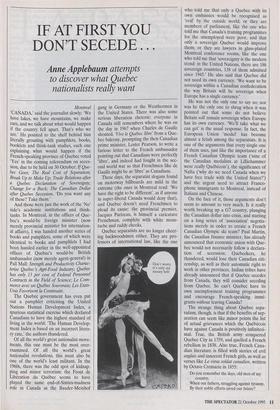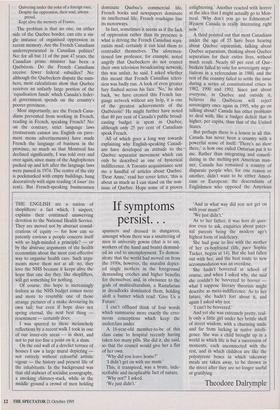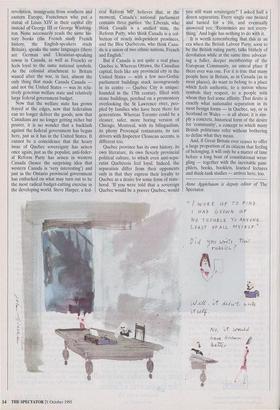IF AT FIRST YOU DON'T SECEDE . . .
Anne Applebaum attempts
to discover what Quebec nationalists really want
Montreal `CANADA,' said the journalist slowly: 'We have lakes, we have mountains, we make cars, and we talk about what would happen if the country fell apart. That's who we are.' He pointed to the shelf behind him literally groaning with pamphlets, books, booklets and think-tank studies, each one explaining what would happen if the French-speaking province of Quebec voted `Yes' in the coming referendum on seces- sion, due to be held on 30 October: If Que- bec Goes; The Real Cost of Separation; Break Up to Make Up; Trade Relations after a Quebec Declaration of Sovereignty; Change for a Buck; The Canadian Dollar after Quebec Secession. 'Do you want any of these? Take them.'
And those were just the work of the 'No' side's academic institutions and think- tanks. In Montreal, in the offices of Que- bec's would-be foreign minister (now merely provincial minister for internation- al affairs), I was handed another series of books and pamphlets, some of which were identical to books and pamphlets I had been handed earlier in the well-appointed offices of Quebec's would-be British ambassador (now merely agent-general) in Pall Mall: Strength and Productivity Charac- terise Quebec's Agri-Food Industry; Quebec has only 13 per cent of Federal Personnel Contracts in the Field of Science; Le Com- merce avec un Quebec Souverain; Les Etats- Unis Favorisent la Continuite.
The Quebec government has even put out a pamphlet criticising the United Nations Human Development Index, a spurious statistical exercise which declared Canadians to have the highest standard of living in the world: 'The Human Develop- ment Index is based on an incorrect litera- cy rate,' the authors thundered.
Of all the world's great nationalist move- ments, this one must be the most over- examined. Of all the world's great nationalist revolutions, this must also be one of the world's least militant. In the 1960s, there was the odd spot of kidnap- ping and minor terrorism: the Front de Liberation du Quebec seems to have played the same end-of-Sixties-madness role in Canada as the Baader-Meinhof gang in Germany or the Weathermen in the United States. There was also some serious liberation rhetoric: everyone in Canada still remembers where he was on the day in 1967 when Charles de Gaulle shouted, Wive le Quebec libre' from a Que- bec balcony, prompting the then Canadian prime minister, Lester Pearson, to write a furious letter to the French ambassador pointing out that Canadians were perfectly `libre', and indeed had fought in the sec- ond world war so that Frenchmen like de Gaulle might be as `libre' as Canadians.
These days, the separatist slogans found on motorway billboards are mild in the extreme (the ones in Montreal read: 'We have the right to be different', as if anyone in super-liberal Canada would deny that), and Quebec doesn't need Frenchmen to plead its cause: the provincial premier, Jacques Parizeau, is himself a caricature Frenchman, complete with white mous- tache and ruddy cheeks.
Quebec separatists are no longer cheer- ing backwoodsmen either. They are pro- fessors of international law, like the one who told me that only a Quebec with its own embassies would be recognised as `real' by the outside world; or they are members of parliament, like the one who told me that Canada's training programmes for the unemployed were poor, and that only a sovereign Quebec would improve them; or they are lawyers in glass-plated Montreal conference rooms, like the one who told me that 'sovereignty is the modern trend: in the United Nations, there are 186 sovereign countries, 138 of them admitted since 1945.' He also said that Quebec did not need its own currency. 'We want to be sovereign within a Canadian confederation the way Britain will be sovereign when Europe has a single currency.'
He was not the only one to say so; nor was he the only one to shrug when it was pointed out that some do not believe Britain will remain sovereign when Europe has its own currency. 'We'll take what we can get' is the usual response. In fact, the European Union 'model' has become almost a fetish among the separatists. It is one of the arguments that every single one of them uses, just like the importance of a French Canadian Olympic team (`nine of the Canadian medalists at Lilliehammer were really Quebecois), the significance of Nafta (`why do we need Canada when we have free trade with the United States?') and the urgent need to attract Franco- phone immigrants to Montreal, instead of Italians and Chinese.
On the face of it, those arguments don't seem to amount to very much. Is it really worth breaking up a G7 country, plunging the Canadian dollar into crisis, and starting on a long series of 'association' negotia- tions merely in order to create a French Canadian Olympic ski team? Paul Martin, the Canadian finance minister, has already announced that economic union with Que- bec would not necessarily follow a declara- tion of secession: Quebeckers, he thundered, would lose their Canadian citi- zenship, as well as their automatic right to work in other provinces. Indian tribes have already announced that if Quebec secedes from Canada, they will consider seceding from Quebec. So can't Quebec have its own unemployment training programmes and encourage French-speaking immi- grants without leaving Canada?
The strange thing about Quebec sepa- ratism, though, is that if the benefits of sep- aration can seem like minor points the list of actual grievances which the Quebecois have against Canada is positively infinitesi- mal. True, the British army conquered Quebec City in 1759, and quelled a French rebellion in 1838. Also true, French Cana- dian literature is filled with stories of evil anglais and innocent French girls, as well as verses like Le vieux soldat canadien, written by Octave Cremazie in 1855:
Do you remember the days, old men of my country, When our fathers, struggling against tyranny, By their noble efforts saved our future? Quivering under the yoke of a foreign race, Despite the oppression, their soul, always proud, Kept alive the memory of France.
The problem is that no one, on either side of the Quebec border, can cite a sin- gle instance of organised oppression in recent memory. Are the French Canadians underrepresented in Canadian politics? No: for all but 11 of the past 47 years, the Canadian prime minister has been a Quebecois. Do the French Canadians receive fewer federal subsidies? No: although the Quebeckers dispute the num- bers, most calculations show that Quebec receives an unfairly large portion of the `equalisation funds' which Canada's feder- al government spends on the country's poorer provinces.
Most importantly, are the French Cana- dians prevented from working in French, reading in French, speaking French? No: on the contrary, strict language laws (restaurants cannot use English on pave- ment menu advertisements) have made French the language of business in the province, so much so that Montreal has declined significantly, I was told over and over again, since many of the Anglophones packed up and left after the language laws were passed in 1974. The centre of the city is pockmarked with empty buildings, hung decoratively with signs reading 'A louer' (to rent). But French-speaking businessmen dominate Quebec's commercial life, French books and newspapers dominate its intellectual life, French roadsigns line its motorways.
In fact, sometimes it seems as if the lack of oppression rather than its presence is what is driving the French Canadian sepa- ratists mad; certainly it can lead them to contradict themselves. The aforemen- tioned law professor, for example, noted angrily that Quebeckers do not control their own television broadcasting network; this was unfair, he said. I asked whether this meant that French Canadian televi- sion was badly run. A look of even greater fury flashed across his face. 'No,' he shot back, 'we have created this French lan- guage network without any help, it is one of the greatest achievements of the Quebecois!' He might further have noted that 40 per cent of Canada's public broad- casting budget is spent in Quebec, although only 25 per cent of Canadians speak French.
All of which goes a long way towards explaining why English-speaking Canadi- ans have developed an attitude to the • Quebec separatist movement which can only be described as one of hysterical indifference. A Toronto acquaintance sent me a handful of articles about Quebec. `Dear Anne,' read her cover letter, 'this is about as much as I can stand on the non- issue of Quebec. Hope some of it proves enlightening.' Another reacted with horror at the idea that I might actually go to Mon- treal. 'Why don't you go to Edmonton? Western Canada is really interesting right now.'
A third pointed out that most Canadians under the age of 55 have been hearing about Quebec separatism, talking about Quebec separatism, thinking about Quebec separatism for their entire lives, without much result. Nearly 60 per cent of Que- beckers failed to vote for sovereignty nego- tiations in a referendum in 1980, and the rest of the country failed to settle the issue during a series of constitutional crises in 1982, 1990 and 1992. Since just about everyone, in Quebec and outside it, believes the Quebecois will reject sovereignty once again in 1995, why go on talking about? Canada has other problems to deal with, like a budget deficit that is higher, per capita, than that of the United States.
But perhaps there is a lesson in all this. Canada has never been a country with a powerful sense of itself: 'There's no there there,' is how one exiled Ontarian put it to me. Rather than integrating and consoli- dating in the melting-pot American man- ner, Canada has remained a country of disparate people who, for one reason or another, didn't want to be either Ameri- cans or European: the descendants of Englishmen who opposed the American revolution, immigrants from southern and eastern Europe, Frenchmen who put a statue of Louis XIV in their capital city instead of George III or George Washing- ton. None necessarily reads the same his- tory books (the French study French history, the English-speakers study Britain), speaks the same languages (there are German and Ukrainian-speaking towns in Canada, as well as French) or feels loyal to the same national symbols. As the colonial attachment to Britain waned after the war, in fact, almost the only thing that made Canada Canada and not the United States — was its rela- tively generous welfare state and relatively large federal government budget.
Now that the welfare state has grown frayed at the edges, now that federalism can no longer deliver the goods, now that Canadians are no longer getting richer but poorer, it is no wonder that a backlash against the federal government has begun here, just as it has in the United States. It cannot be a coincidence that the hoary issue of Quebec sovereignty has arisen once again, just as the populist, anti-feder- al Reform Party has arisen in western Canada (hence the surprising idea that western Canada is 'very interesting') and just as the Ontario provincial government has embarked on what may turn out to be the most radical budget-cutting exercise in the developing world. Steve Harper, a fed- eral Reform MP, believes that, at the moment, Canada's national parliament contains three parties: 'the Liberals, who think Canada is a unified state, the Reform Party, who think Canada is a col- lection of nearly independent provinces, and the Bloc Quebecois, who think Cana- da is a union of two ethnic nations, French and English.'
But if Canada is not quite a real place Quebec is. Whereas Ottawa, the Canadian capital, feels like any provincial city in the United States — with a few neo-Gothic parliament buildings stuck incongruously in its centre — Quebec City is unique: founded in the 17th century, filled with stone buildings, perched on a promontory overlooking the St Lawrence river, peo- pled by families who have been there for generations. Whereas Toronto could be a cleaner, safer, more boring version of Chicago, Montreal, with its bilingualism, its phony Provencal restaurants, its taxi drivers with Inspector Clouseau accents, is different too.
Quebec province has its own history, its own literature, its own fiercely provincial political culture, to which even anti-sepa- ratist Quebecois feel loyal. Indeed, the separatists differ from their opponents only in that they express their loyalty to Quebec as a desire for some form of state- hood. 'If you were told that a sovereign Quebec would be a poorer Quebec, would you still want sovereignty?' I asked half a dozen separatists. Every single one twisted and turned for a bit, and eventually answered yes: 'Economics are not every- thing.' And logic has nothing to do with it.
It is worth remembering that this in an era when the British Labour Party, soon to be the British ruling party, talks blithely of devolution while at the same time advocat- ing a fuller, deeper membership of the European Community, an unreal place if there ever was one. For it is true that many people here in Britain, as in Canada (as in most places), do want to belong to a place which feels authentic, to a nation whose symbols they respect, to a people with whom they feel some affinity. That desire is exactly what nationalist separatism in its most benign forms — in Quebec, say, or in Scotland or Wales — is all about; it is sim- ply a concrete, historical form of the desire for 'community', a concept to which many British politicians refer without bothering to define what they mean.
And, if Great Britain ever ceases to offer a large proportion of its citizens that feeling of belonging, it will only be a matter of time before a long bout of constitutional wran- gling — together with the inevitable pam- phlets, books, booklets, learned lectures and think-tank studies — arrives here, too.
Anne Applebaum is deputy editor of The Spectator.












































































 Previous page
Previous page